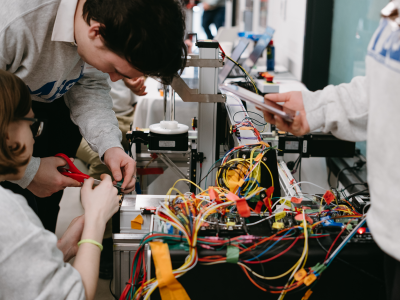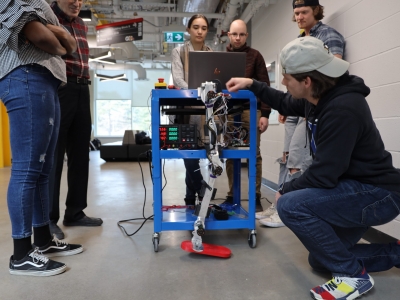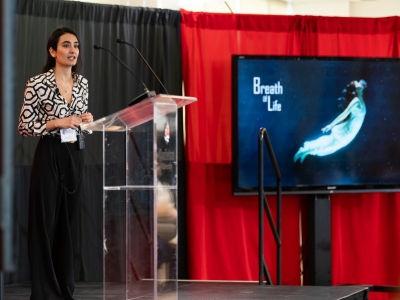
Shaun Marshall (BEng/90 – Electrical Engineering) displays the newly released 2016 Cadillac CT6.
Carleton Electrical Engineering Grad Shaun Marshall (BEng/90) serves as the Engineering Group Manager for Connected Vehicle and Human Machine Interface Advanced Technology at GM Canada. Over the years, he has taken on numerous roles within the auto industry giant, resulting in a deep understanding of vehicle development.
With a specialized expertise in electrical architecture, Shaun was responsible for the overall electrical interconnection and integration of the first generation Chevrolet Equinox and Pontiac Torrent. He also led the wiring and electrical architecture team for the second generation Equinox and the GMC Terrain that GM still produces today.
We recently had the chance to speak with Shaun to discuss his experiences at Carleton, his current role at GM Canada, and how GM’s new mandate looks to shape the future of a connected auto industry.
Carleton University – How did you initially become interested in electrical engineering?
Shaun Marshall – By the time I was in high school, I had an older brother who had already graduated as an engineer, so that pathway was a familiar option. I had strong math and science skills and ended up taking auto and electrical shop classes early in high school. When I was able to start computer classes in grade 10 with Apple clones, I think my future was pretty much sealed.
CU – What drew you to Carleton specifically?
SM – Carleton always had a solid reputation for engineering and was strong in the adjacent areas of architecture and design. Having grown up in Ottawa, I already knew it was a great city, so I felt no need to leave to pursue my post-secondary education. In a recent conversation with Dr. Rafik Goubran, Dean of the Faculty of Engineering and Design, I actually learned that about 30% of the students who enroll in engineering at Carleton come from the local community, which really resonates with me, as many of my classmates were local high school graduates and a handful even came from my high school.
CU – Can you tell us a bit about your current role with GM Canada?
SM – Having joined GM in 1999, I’ve held numerous roles over the years. At present I am the Engineering Group Manager for Connected Vehicle and Human Machine Interface Advanced Technology at GM’s Canadian Technical Centre in Oshawa, Ontario. I am responsible for an innovative team of engineers that is working on next generation connectivity solutions, as well as interfaces that support GM’s plan to be relevant well into the future by disrupting itself with innovation.
CU – How did your studies at Carleton help you prepare for a career in the automotive industry?
SM – Looking back, it was important that we spent over two years focusing on the common fundamentals of engineering before engaging in a specialization. Developing that core foundation enabled me to have a good understanding of cross-disciplinary engineering challenges. Automobiles are the perfect example of just such a challenge. While my role is largely electrical, being familiar with other vehicle systems inevitably leads to an integrated and better overall solution, whether it relates to the manufacturing processes, electro-mechanical system interactions, or simply the integration of electrical components into the overall vehicle structure.
CU – Do you recall any professors who were influential to your education?
SM – While it’s difficult to recall names from over 25 years ago, I do remember Professor Moyra McDill. Her teaching style and her energy and excitement surrounding engineering was infectious. She was certainly inspirational, which made it easy for me to be engaged and stay focused on my studies. I am not surprised that she was later named a Professor Emeritus at Carleton.
CU – GM was at the forefront of connected cars in developing OnStar services. With connected cars becoming standard across manufacturers, what is the next big innovation for the automotive industry?
SM – GM’s CEO Mary Barra has said that the auto industry will see more changes in the next five years than it has over the last fifty. The world’s established automakers, along with Google, Apple, Tesla, and Uber are all working towards highly connected vehicles and autonomous driving capability. These vehicles will address the challenges facing an aging population, as well as the interests pertaining to youth and the sharing economy. GM has said it needs to look beyond the number of vehicles sold as a key metric and focus on the number of miles driven, meaning mobility as a service will be a key opportunity as we look towards the future.
CU – During his recent visit to Carleton, the president of GM Canada spoke about disrupting ourselves and the future of mobility. How will GM’s research and development agenda address emerging areas of automotive technology?
SM – GM engineers and researchers are looking at technologies for the future and building partnerships that will further those solutions. We are pursuing these technologies and partnerships knowing that they will disrupt our traditional business model, but also bring about immensely positive change. Here in Canada, our engineering teams are working on future technologies that enable and support our customers as we move towards greater connectivity in our vehicles, as well as towards autonomous driving. GM’s significant investment in these areas can be seen in our recent partnership with Lyft and our acquisition of both Cruise Automation and Sidecar.
CU – What are you most excited about in terms of GM’s new mandate?
SM – Our new mandate in Canada means that GM recognizes the talent that we can attract from Canadian Universities. The strength we have established within our team and the Canadian ecosystem makes me both proud and excited about our opportunities to develop leading technologies here in Canada that will support GM’s vision of connected and autonomous vehicles.
CU – What advice would you offer to new graduates as they enter the workforce?
SM – Growth is all about experience. There is no single road to success, but choosing assignments that enable your development and challenge you will put you on the right path. Engineering is also about finding integrated solutions. As you work through your studies, find opportunities to be part of teams and projects – these experiences will help you build the skills that are essential to success. Finally, on a personal level, strive to make a difference, to enrich everything you can, and to leave things better than when you found them.



